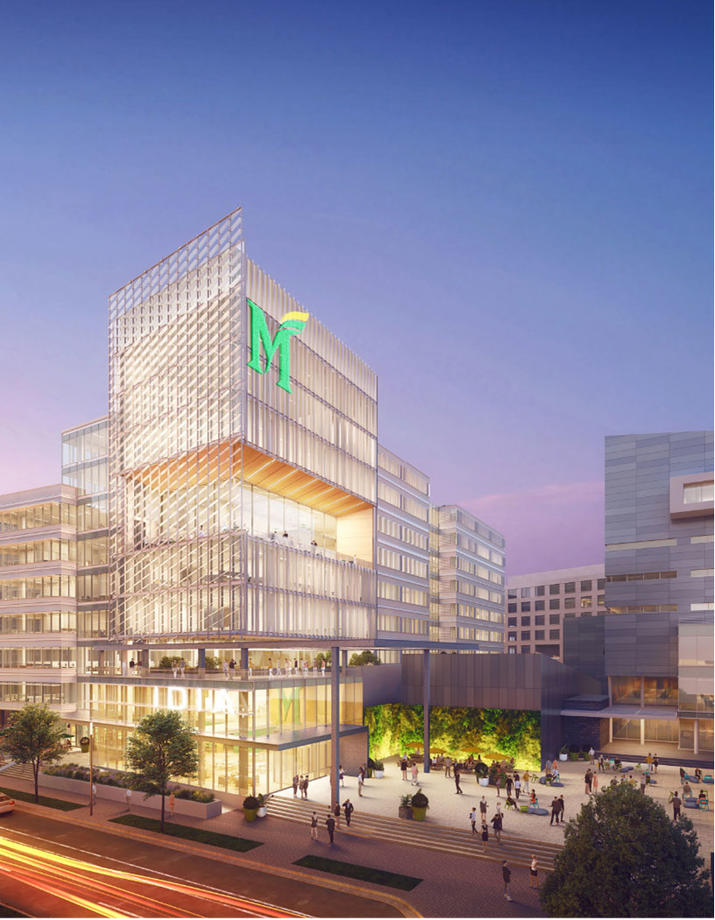Board of Visitors approves negotiations with Mason Innovation Partners
George Mason University’s Board of Visitors has authorized the university to begin official negotiations with the newly formed Mason Innovation Partners as the potential development partner for the transformation of its Arlington Campus in the heart of the Rossyln-Ballston corridor.
The expanded campus will feature up to 360,500 square feet of new space dedicated to producing the next generation of Northern Virginia’s technology workforce, both for the public and private sectors. The new building will be a mixed-use, multi-tenant space adjacent to Mason’s existing presence in Virginia Square, and it will house faculty from Mason’s Institute for Digital InnovAtion (IDIA) and the proposed new School of Computing.
“We are thrilled to move to the next stage in this process,” said George Mason University President Gregory Washington. “Mason Innovation Partners has shown that they share our vision for what this building can be and what it can do for all of Northern Virginia.”
Mason Innovation Partners (MIP) is a consortium that includes Edgemoor Infrastructure & Real Estate as developer and investor and Harrison Street as a capital partner, as well as other project development team members.
The Arlington Campus expansion is made possible through a $84 million investment from the Virginia General Assembly. The university also will fund an additional $84 million through philanthropy, of which $21 million has already been raised.
Mason’s Arlington initiative is critical to the Commonwealth of Virginia’s Tech Talent Investment Program (TTIP), a 20-year program designed to produce 25,000 additional graduates in computer science, computer engineering and software engineering. Initiated in part by Amazon’s decision to locate its new headquarters in Arlington, the state launched TTIP to build and sustain a diverse tech talent pipeline. Mason’s leadership role in TTIP reflects its standing as Virginia’s largest and most diverse public university and the largest producer of technology talent in the state.
“The Commonwealth of Virginia has been proactive in identifying the skills needed by tomorrow’s workforce, and has combined that with real action,” said Jimmy Hazel, rector of Mason’s Board of Visitors. “As more and more technology companies land and grow in Virginia, George Mason University will be the key source of employee talent.”
The building itself is anticipated as the university’s first LEED platinum building and will incorporate advanced cyberinfrastructure and design to support digital innovation, active learning, cutting-edge research and tech incubators. There also will be collaboration and convening spaces to support public programming for the Arlington community, ground-floor retail, a below-grade parking garage and a public plaza. This facility will offer an ecosystem for commercial tenants as well, providing proximity to Mason students and faculty, high-tech talent, and collision space.
“All of us at Mason are excited to be moving forward on this tremendous project with MIP to realize this significant expansion of our Arlington Campus,” said Carol Dillon Kissal, Mason’s senior vice president for administration and finance. “Everything about this project is innovative, from being Mason’s anticipated first LEED platinum building to the ground-breaking, collaborative work that it will facilitate and inspire when it opens in 2025. The Arlington Campus will help transform the Rosslyn-Ballston corridor and establish it as the top tech-talent pipeline in the Commonwealth.”
The expanded campus will be a digital innovation research hub for learners, educators, entrepreneurs, innovators and industry partners to Mason’s Arlington Campus. Mason’s footprint in Arlington—home to the Antonin Scalia School of Law, the Carter School for Peace and Conflict Resolution, the Schar School for Policy and Government and the Arts Management and the School of Business graduate programs —provides a unique ecosystem for cross-discipline collaboration and a foundation for a future innovation district in the Rosslyn-Ballston corridor.
Demolition soon will begin on the original building at the site, with completion in fall 2021. A comprehensive agreement will be finalized and executed by December 2021. Construction is slated to begin in spring 2022, and the building is scheduled to open in summer 2025.
Media Contact:
Robin Rose Parker
rparkera@gmu.edu
703.993.6220
About George Mason University
George Mason University is Virginia’s largest public research university. Located near Washington, D.C., Mason enrolls 38,000 students from 130 countries and all 50 states. Mason has grown rapidly over the last half-century and is recognized for its innovation and entrepreneurship, remarkable diversity and commitment to accessibility. Learn more at GMU.edu.

